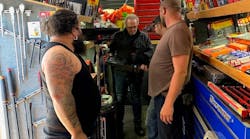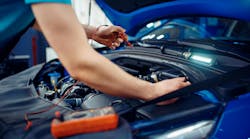The California Energy Commission approved $3,270,066 for projects that will keep the state on track to a clean transportation future.
"These awards will increase the availability of alternative and renewable vehicle fuels, and will help to fulfill the Governor's goal of significantly expanding the market for zero emission vehicles in the state," said Energy Commission Chair Robert B. Weisenmiller. "Additionally, these investments benefit all Californians by improving air quality, creating jobs and reducing petroleum use."
The approved awards were made through the Commission's Alternative and Renewable Fuel and Vehicle Technology Program, created by Assembly Bill 118. The program, which is essential to fulfilling the state's pioneering climate-change policies, is slated to invest approximately $90 million during this fiscal year to develop new transportation technologies, as well as alternative and renewable fuels. It is paid for through surcharges on vehicle and boating registrations, and smog check and license plate fees.
These awards also help to fulfill Gov. Brown's executive order directing state government to support and facilitate the rapid commercialization of zero-emission vehicles (ZEVs) in California, with a 2025 target of having 1.5 million ZEVs on the state's roads. The order also requires the installation of sufficient infrastructure to support 1 million ZEVs in California by 2025.
The state's investments in these projects are safeguarded by matching fund requirements for awardees, and by making payments on a reimbursement basis.
Two awards approved Wednesday will expand plug-in electric vehicle (EV) charging options in the San Diego area. The recipients of these awards are:
ChargePoint, Inc., will receive $499,512 for the installation of 138 dual Level 2 electric vehicle charging stations, and 68 home charging stations at multi-family residences within the city of San Diego. Installing such infrastructure helps to overcome the challenge of access to residential electric vehicle charging options for those who live in multi-family buildings and may not have their own private parking spaces or authority to install their own charging equipment. Level 2 charging systems are expected to become the most commonly used. They use 208-240 volt power and typically provide 10 to 20 miles of range for each hour of charging for a passenger vehicle. ChargePoint, formerly Coulomb Technologies, is based in Campbell (Santa Clara County).
Alternative Energy Systems Consulting, Inc., will receive $220,554 to purchase and install electric vehicle charging equipment on the campus of the University of California, San Diego. The funded projects will expand the campus charging network, and reduce the campus fleet's petroleum consumption and greenhouse gas emissions. Of the award, $145,554 will be used to install and assess the performance of three publicly accessible DC fast chargers by RWE. DC fast-charging systems typically provide 60 to 80 miles of range in just 20 minutes of charging. Additionally, $75,000 will be used to install eight dual RWE Level 2 eStation Smart Systems, for a total of 16 charging outlets. Alternative Energy Systems Consulting is based in Carlsbad (San Diego County).
The Energy Commission also approved four awards totaling $2,550,000 to increase the storage, distribution and dispensing of alternative fuels in the state.
The award recipients are:
RTC Fuels, LLC (also known as Pearson Fuels), will receive $1,350,000 for the installation of E85 dispensing equipment at 19 existing fueling stations throughout California. E85 fuel is a mix of 15 percent conventional gasoline and 85 percent ethanol, an alcohol derived from plant material. Flex-fuel vehicles can run on E85 or conventional gasoline. The Energy Commission expects the E85 vehicle fuel market in California will eventually be the largest in the United States, with approximately 55,000 new flex-fuel vehicles purchased in the state each year. Use of E85 fuel reduces petroleum consumption and tailpipe greenhouse gas emissions. However, there are few locations dispensing E85 fuel in the state. This project includes collecting data on station operations to help provide a demonstration of the feasibility of developing stations dispensing E85 fuel.
Blackhawk Logistics, LLC, will receive $600,000 to build a publicly accessible liquefied natural gas station to fuel trucks in the Blythe area (Riverside County), including the fleet of HayDay Farms and other natural gas trucks traveling the I-10 route. Blackhawk Logistics is a jointly held company of HayDay Farms., Inc., and Border Valley Trading, Ltd.
Lompoc Unified School District in Santa Barbara County will receive $300,000 to build a new CNG fueling station to serve its fleet of CNG buses and other student transport vehicles, as well as the public. The fueling capacity will allow the school district to expand its fleet of CNG school buses from 10 to at least 14, which will displace the equivalent of 26,040 gallons of diesel fuel annually, and reduce student exposure to potentially health-threatening pollution.
The Santa Ynez Band of Chumash Indians will receive $300,000 to convert an existing public gas station into a public compressed natural gas (CNG) station to meet the needs of local customers and fleets, as well as drivers traveling through the area. CNG is a cleaner burning, less polluting and less expensive vehicle fuel than gasoline or diesel. The Santa Ynez Band of Chumash Indians is based in Santa Ynez, Santa Barbara County.

